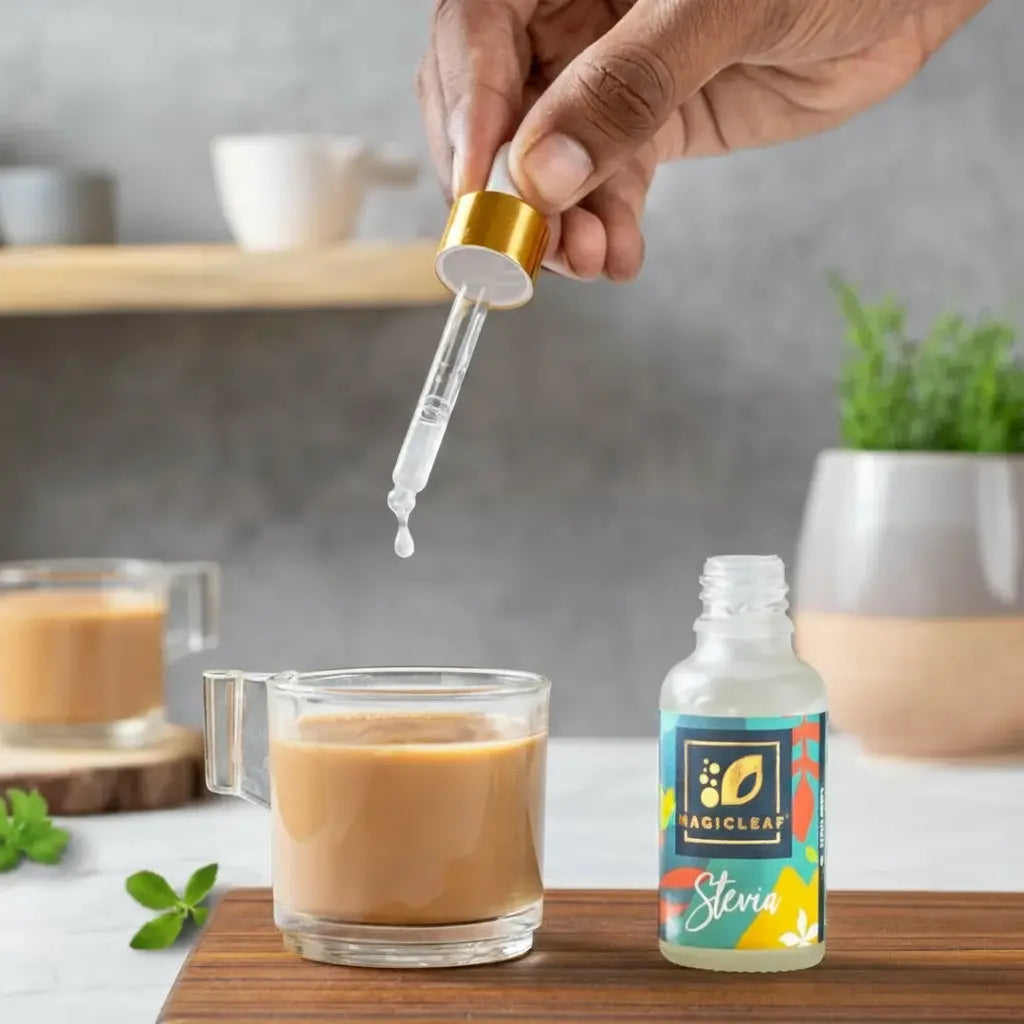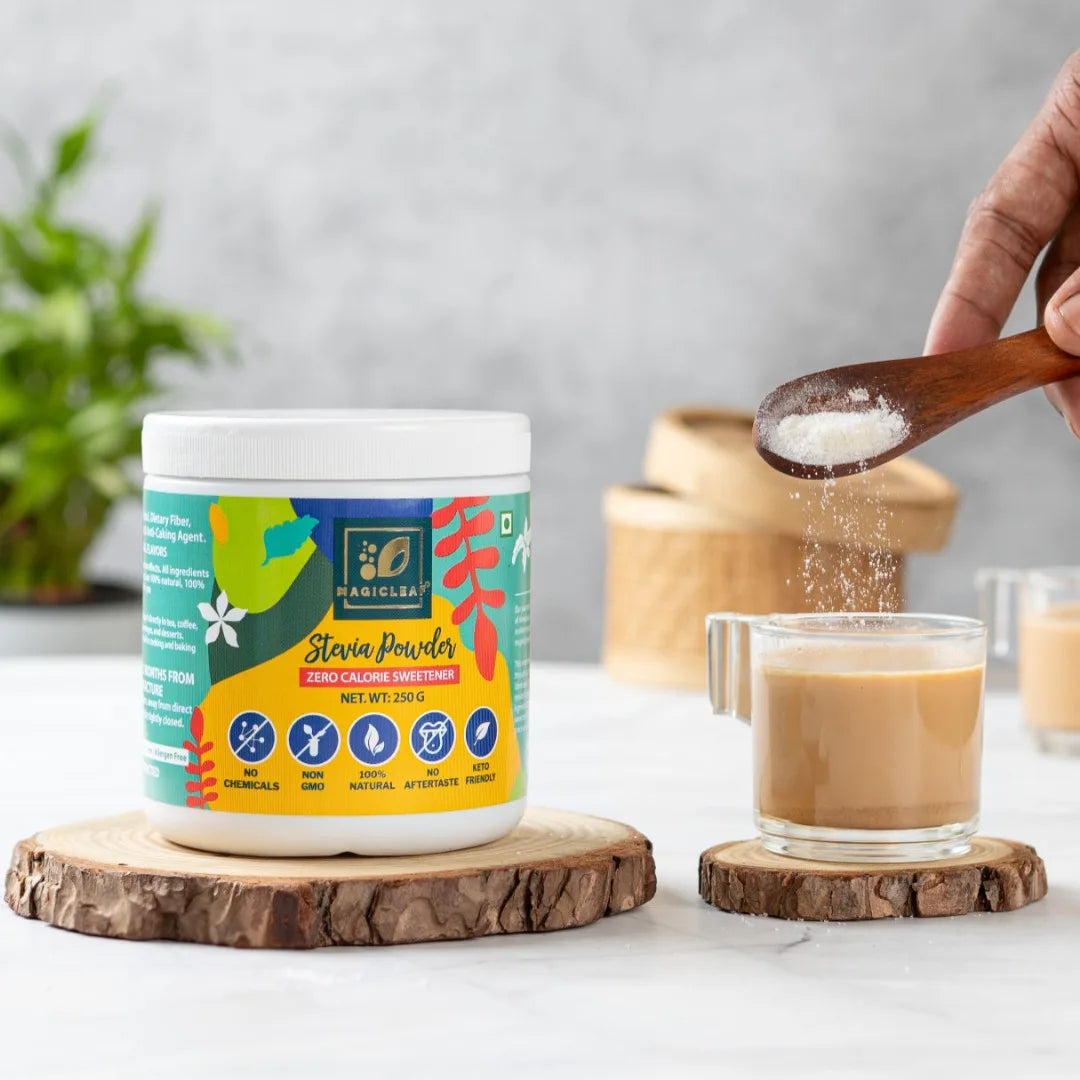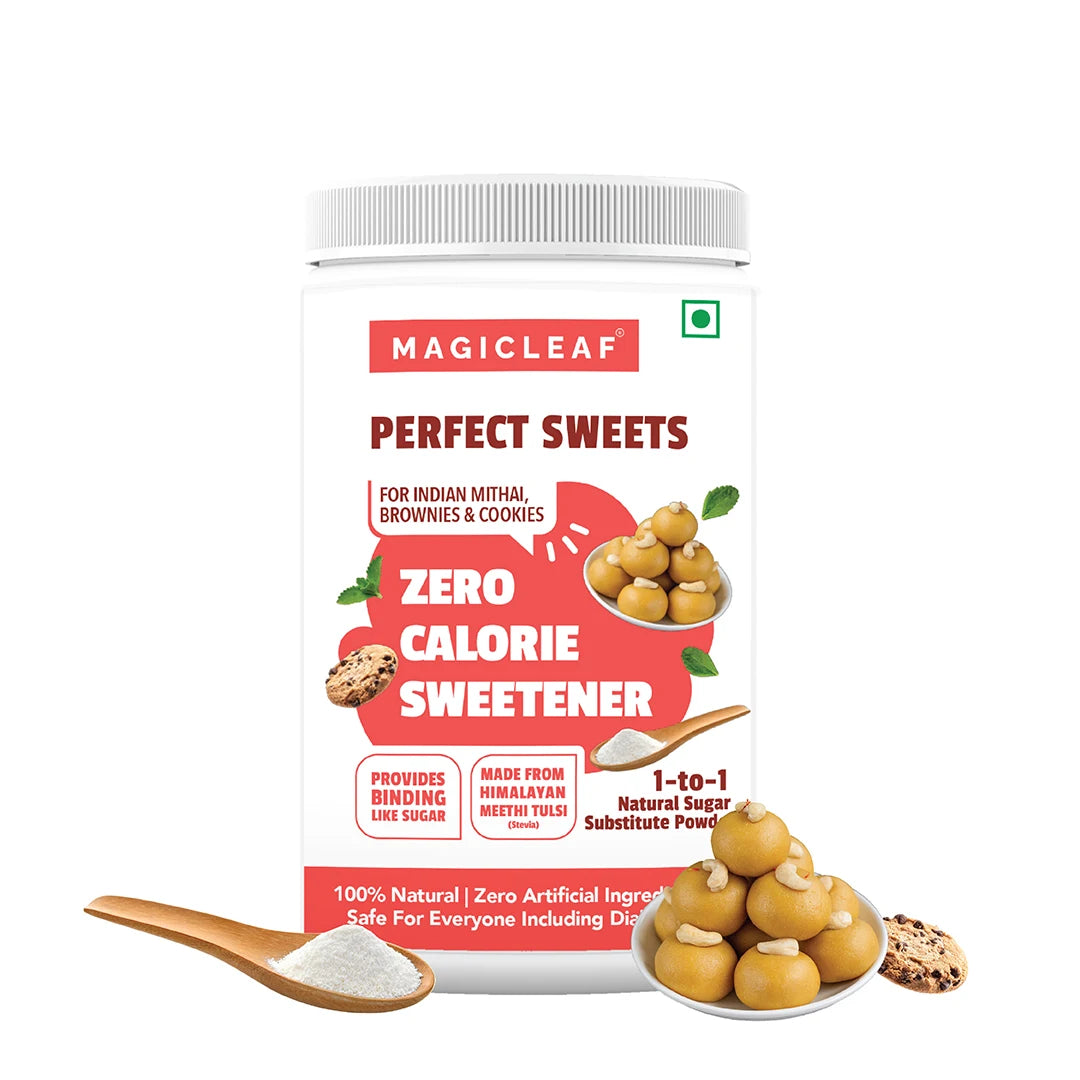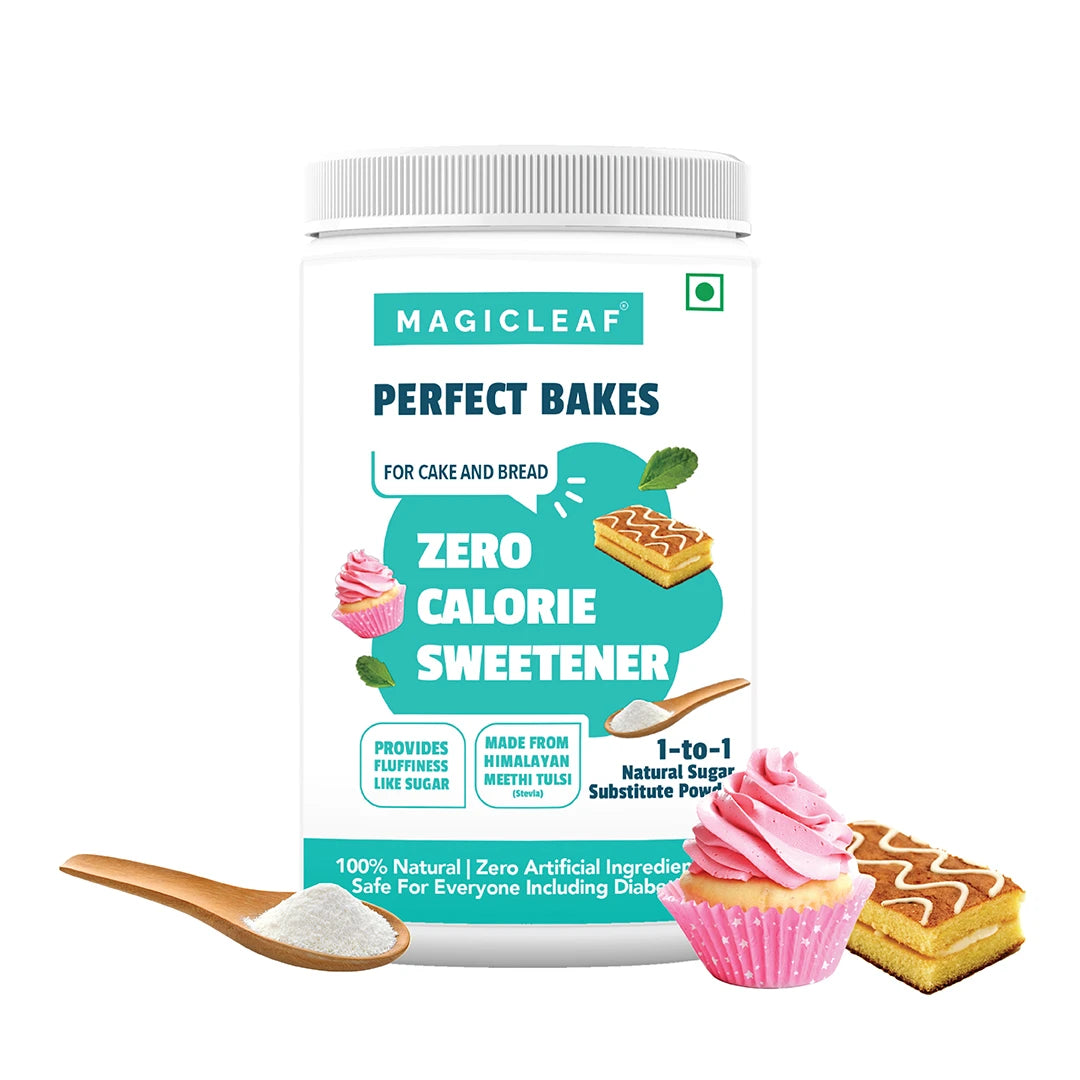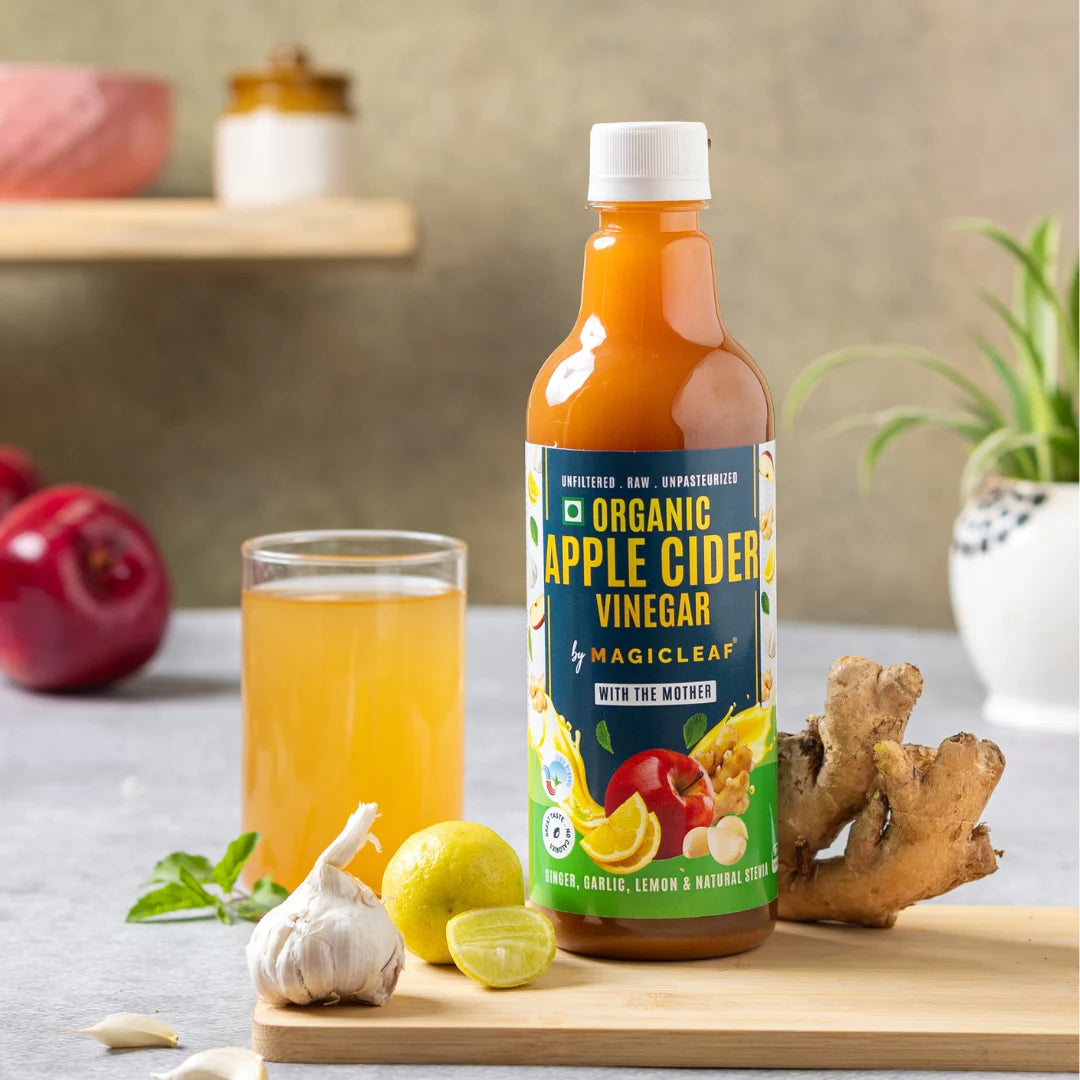| Aspect | Sugar | Stevia |
|---|---|---|
| Source | Naturally occurring in plants like sugarcane and sugar beets | Extracted from the leaves of the Stevia rebaudiana plant |
| Production Origin | Widely produced globally, with significant cultivation in regions like Brazil, India, China, and the United States. | Main producer: Japan. Cultivation in various regions worldwide, including India, which has been actively adopting stevia cultivation as part of its efforts towards sustainable agriculture. |
| Usage in Various Foods and Drinks | Commonly used in a wide range of foods and beverages. | Increasingly incorporated into foods and drinks as a natural sugar alternative. |
|
Glycemic Index (It measures how quickly food raises blood sugar levels.) |
High (around 65) | 0 |
| Calories | High (4 calories per gram) | 0 |
| Health Impact | Excessive consumption linked to health issues like obesity, diabetes, and dental problems. | Provides sweetness without calories, making it a healthier alternative to sugar. |
| Historical Background | Long-standing use as a sweetener, but associated with health concerns due to overconsumption. | Emerged as a natural sweetener with fewer health risks, gaining popularity as a healthier alternative to sugar. |
| Overall Performance | Commonly used but contributes to health problems when consumed excessively. | Offers a healthier option without sacrificing taste or texture, making it ideal for health-conscious baking. |
Two of the most widely used sweeteners in modern times are sugar and Stevia. Although sugar has been a common sweetener for thousands of years, Stevia is a more recent addition to the market. The history of stevia and sugar, as well as their first applications, modifications over time, and contemporary comparisons of their respective uses, will all be covered in this article.
The History of Stevia
The herb Stevia rebaudiana, native to South America, is used as a natural sweetener. Previous to the sixteenth century, indigenous people used the stevia plant to sweeten foods and medicines.
In reality, the Stevia plant was traditionally utilized more than 200 years ago because of its sweet taste and flavour-enhancing properties. Typically, sweeteners manufactured from a crude preparation (powder or liquid) of the stevia leaf are referred to as stevia. Only a small portion of the various chemicals that these treatments may include are sweet. Although the entire plant is referred to as "stevia," only some parts of the leaf are sweet. Steviol glycosides are the name for these sugary substances.
The glycoside that gives Stevia its sweet flavour was discovered by French researchers Briedel and Lavieille in the late 1800s. We called this substance stevioside. Due to restrictions and shortages of sugar during World War II, Stevia was actively consumed in the United Kingdom.
When Stevia was first brought to Japan in the 1970s, studies were conducted to see whether it would be beneficial to human health. Since then, Japan has been a leading producer of Stevia and has been aggressively using this sweetener in a range of meals. Many American companies may use it in their products because there is a large market demand for low- or no-calorie sweeteners.
For those looking to avoid sugar completely, Stevia is the safest alternative available because it is derived from a herb rather than a chemical.
History of Sugar:
Over 2,000 years make up the intriguing history of sugar. About 2,500 years ago, the first sugar was chemically refined in India. From there, the process moved eastward to China, westward to Persia and the early Islamic countries, and eventually reached the Mediterranean in the 13th century. Sugar manufacturing grew in importance in Cyprus and Sicily, and during the Middle Ages, sugar was regarded as a luxury good rather than a common condiment. In the latter half of the 15th century, sugarcane was first grown specifically for large-scale refinement and trade, and it was the Portuguese who discovered that new and ideal circumstances for sugar plantations existed.
With the invention of new technologies for refining sugar from sugar cane and sugar beets, the sugar industry expanded quickly in the 19th century. In Europe, sugar was considered a luxury good until the eighteenth century, when it became more accessible and reasonably priced. The development of beet sugar originated in Germany, and its popularity spread to Prussia and then to France under Napoleon's reign, increasing access to sugar. Sugar is a common element in a wide variety of meals, preserves and drinks these days, and consuming too much of it has been connected to a number of health issues, such as diabetes and obesity.
Innovations Through the Years
Stevia was first widely utilized as a sweetener in Japan in the 1970s, and since then, it has been incorporated into many other foods. Ongoing research aims to explore potential health benefits associated with stevia, including its potential role in weight management and its suitability as a sugar substitute. Stevia is superior to regular sugar since it is low-glycemic and has no calories.
Comparison in Terms of Usage in Modern Age
While both Stevia and sugar are sweeteners, they are very different in terms of their health benefits and nutritional content. One of the primary distinctions is that sugar has a substantial calorie content, whereas Stevia is nutritious and calorie-free. Compared to sugar, which has four calories per gram in our bodies, Stevia is a far sweeter carbohydrate that contains no calories. Improved insulin sensitivity is crucial for controlling blood sugar levels if you have diabetes, and stevia has been shown to aid with this. It might also have anti-inflammatory and antioxidant qualities, though more studies are required to verify this.
Nowadays, Stevia is becoming more and more popular as a calorie-free, plant-based substitute for sugar. Because it comes from a plant rather than a lab, it is preferred by many over artificial sweeteners like sucralose and aspartame.


